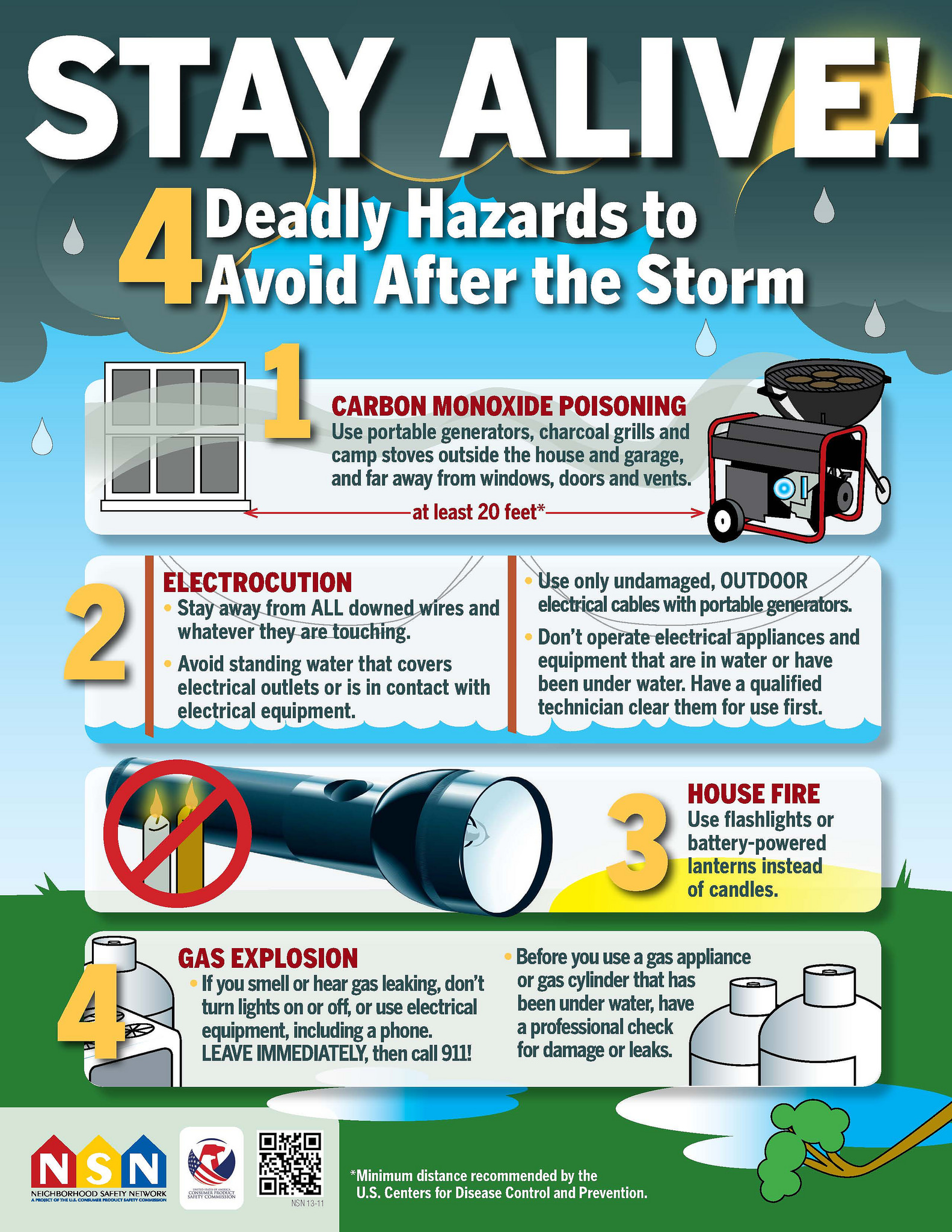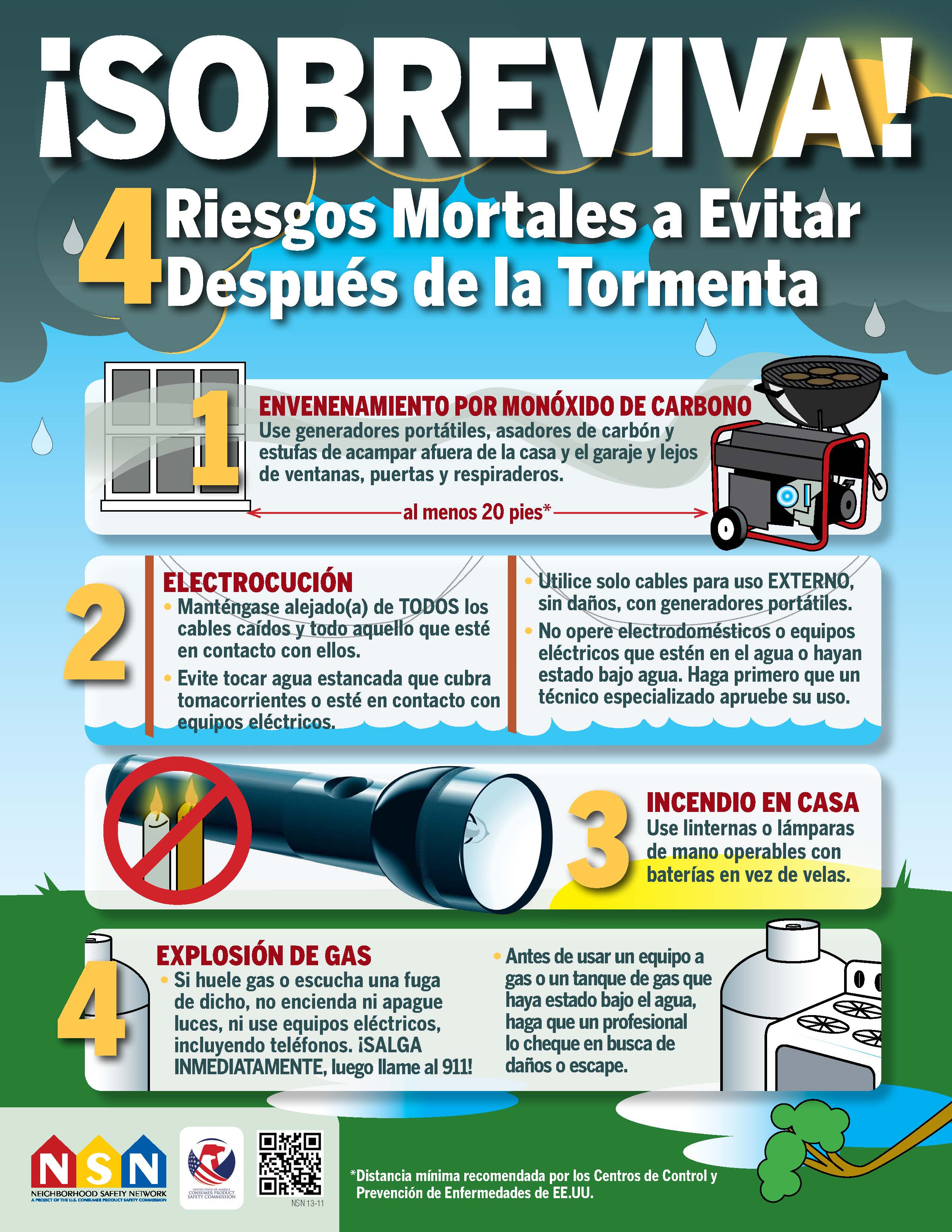WASHINGTON, D.C. – The U.S. Consumer Product Safety Commission (CPSC) is reminding consumers of the deadly dangers after Hurricane Lane and offers some lifesaving safety tips.
Generator Safety:
Hurricanes can cause widespread power outages and that means many consumers will use their portable generators. “Consumers need to be especially careful during power outages, because the risk of carbon monoxide, CO poisoning and fire increases,” says CPSC Chairman Ann Marie Buerkle. “Make sure there are battery-operated CO alarms or CO alarms with battery backup installed in your home - outside separate sleeping areas and on each floor of your home and that they are working properly,” she added. The Chairman also says to “ make sure your generator has had proper maintenance and you have the proper extension cords for connecting the items you need to power – and that it is only used outside your house, never inside.”
CO is an invisible killer. It’s colorless and odorless. More than 400 people die each year in the United States from CO poisoning, about 70 of those are related to portable generators. Other generator safety tips include:
- Never ignore a carbon monoxide alarm when it rings. Get outside immediately. Then call 911.
- Get to fresh air immediately if you start to feel sick, weak or dizzy, and then call 911. CO poisoning from portable generators can happen so quickly that exposed persons may become unconscious instead of experiencing these symptoms.
Other hazards after a storm:
CHARCOAL DANGER:
- Never use charcoal indoors. Burning charcoal in an enclosed space can produce lethal levels of carbon monoxide.
CANDLES:
- Use caution when burning candles. Use flashlights instead. If you must use candles, do not burn them on or near anything that can catch fire. Never leave burning candles unattended. Extinguish candles when you leave the room.
WET APPLIANCES:
- Look for signs that your appliances have gotten wet. Discard electrical or gas appliances that have been wet because they pose electric shock and fire hazards.
- Before using your appliances, have a professional or your gas or electric company evaluate your home and replace all gas control valves, electrical wiring, circuit breakers, and fuses that have been under water.
GAS LEAKS: IF YOU SMELL GAS, REPORT IT
If you smell or hear gas, do not turn lights on or off, or use electrical equipment, including a phone.
CPSC resources:
Message from CPSC Acting Chairman Ann Marie Buerkle’s on hurricane safety.
Hurricane Safety PSA – 3 Tips To Weather The Storm (30 second).
CPSC spokespeople are available for interviews. Call the office of communications to arrange for an interview weekdays at 301-504-7908; weekend 240-997-0478.
About the U.S. CPSC
The U.S. Consumer Product Safety Commission (CPSC) is charged with protecting the public from unreasonable risk of injury associated with the use of thousands of types of consumer products. Deaths, injuries, and property damage from consumer product-related incidents cost the nation more than $1 trillion annually. Since the CPSC was established more than 50 years ago, it has worked to ensure the safety of consumer products, which has contributed to a decline in injuries associated with these products.
Federal law prohibits any person from selling products subject to a Commission ordered recall or a voluntary recall undertaken in consultation with the CPSC.
For lifesaving information:
- Visit CPSC.gov.
- Sign up to receive our email alerts.
- Follow us on Facebook, Instagram @USCPSC and Twitter @USCPSC.
- Report a dangerous product or a product-related injury on www.SaferProducts.gov.
- Call CPSC’s Hotline at 800-638-2772 (TTY 800-638-8270).
- Contact a media specialist.
Please use the below phone number for all media requests.
Phone: (301) 504-7908
Spanish: (301) 504-7800


